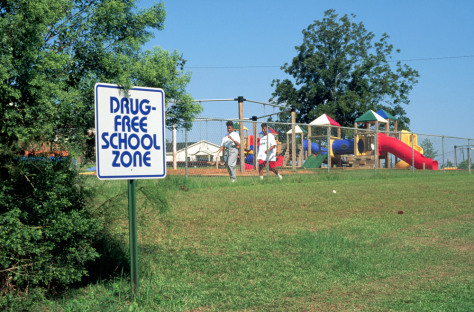
A three-member panel of the Pennsylvania Superior Court held in Commonwealth v. Bizzel, 2014 WL 6756277, that 18 Pa.C.S. § 6317, the drug-free school zone statute, is unconstitutional under United States v. Alleyne, 133 S.Ct. 2151 (2013). The decision is currently under appeal to the Pennsylvania Supreme Court.
Section 6317 of the Crimes Code requires additional, mandatory minimum two-year sentences for adults convicted of drug crimes occurring within 1,000 feet of a school or 250 feet of a bus stop or playground. These geographical factors are categorized as sentencing factors rather than elements of the crime. This is an important distinction. As a sentencing factor, the Commonwealth is not required to prove the distance at trial. In fact, it need not even alert the defendant that the prosecutor intends to seek the additional penalty post-conviction. Sentencing factors, unlike elements of the crime, are judged on a lower standard of proof. Where the elements of the crime must be proven by the formidable “Beyond a Reasonable Doubt” standard that underpins our criminal justice system, under the statute, this sentencing factor required only proof by a “Preponderance of the Evidence,” a much-lesser standard. Where the prosecution seeks the mandatory minimum, and meets the low threshold, the trial judge is required to impose the additional sentence.
As anyone can see, the existence of “sentencing factors” undermines the sanctity of the American system of criminal law. Alleyne held that when a mandatory minimum sentence is based on judicial fact-finding of a “sentencing factor,” the “sentencing factor” is in reality an element of a distinct and aggravated crime that must be proven beyond a reasonable doubt. Alleyne left no doubt that section 6317(b), which establishes the sentencing factor regime for school-zone drug crimes, is unconstitutional. The more significant question for the Superior Court panel was whether that specific provision within the statute was severable.
Where a provision of a statute is unconstitutional, rules of statutory construction provide that the provision be severable (thus allowing the remaining portion of the statute to remain valid) except in cases where the unconstitutional part is “so essentially and inseparably connected with, and so depend upon, the void provision or application, that it cannot be presumed the General Assembly would have enacted the remaining valid provisions without the void one; or unless the court finds that the remaining valid provisions, standing alone, are incomplete and are incapable of being executed in accordance with the legislative intent.”
In Bizzel, the panel found that, without section 6713(b), there was no enforcement mechanism to apply the rest of the statute. While the General Assembly clearly intended to treat drug crimes occurring near schools differently, the United States Supreme Court invalidated in Alleyne the legislature’s chosen method. Expect the legislature to move quickly, especially if the Supreme Court upholds the panel decision in Bizzel, to correct the drug-free school zone statute.
Judge Bowes concurred, stating her disagreement with the majority’s opinion on the severability of the unconstitutional sentencing factors from the rest of the statute but believing that she was bound by controlling precedent. She argued that the legislature could pass an enforceable mandatory-minimum statute that did not contain any provision as to the applicable burden of proof without constitutional impediment as the “beyond a reasonable doubt” standard would be presumed. She would have preferred to allow prosecutors to prove any mandatory-minimum-setting-facts under the “beyond a reasonable doubt” standard and consider any resulting non-compliance with Alleyne to be harmless error.


















Or contact me privately:
steve@fairlielaw.com
(215) 997–1000